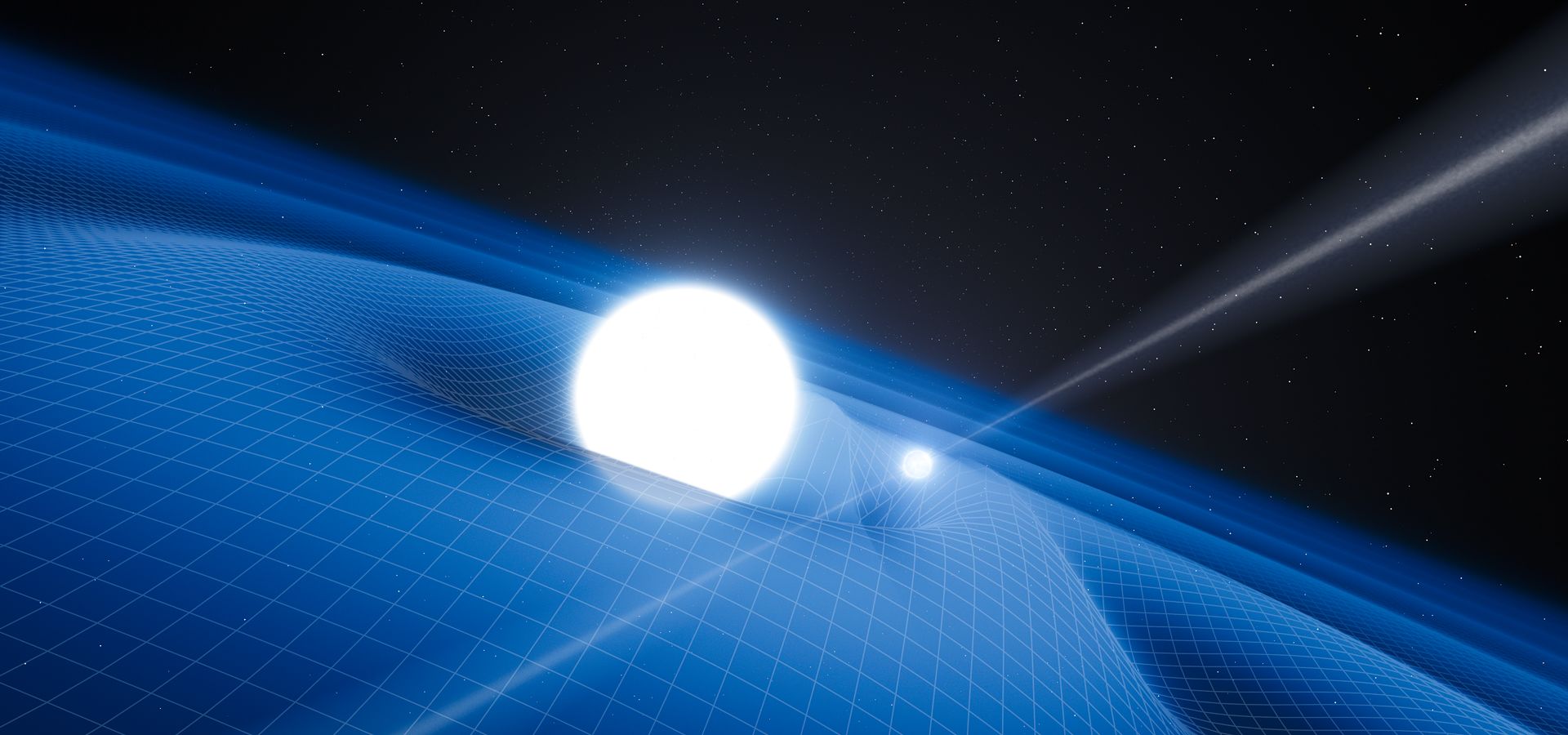
European
Southern
Observatory


In our understanding of the Universe and its physical laws, there are some basic quantities that are assumed to be constant, the so-called fundamental physical constants.
But in recent years cosmologists have begun to question whether these numbers really are constant. The ELT will be able to test whether some of them actually vary throughout space and time – a discovery that would radically change our view of the Universe.
But in recent years cosmologists have begun to question whether these numbers really are constant. The ELT will be able to test whether some of them actually vary throughout space and time – a discovery that would radically change our view of the Universe.
In our understanding of the Universe and its physical laws, there are some basic quantities that are assumed to be constant, the so-called fundamental physical constants.
But in recent years cosmologists have begun to question whether these numbers really are constant. The ELT will be able to test whether some of them actually vary throughout space and time – a discovery that would radically change our view of the Universe.
For millennia we believed that Earth and the heavens were subject to different laws, a view still implicit in our distinction between physics (describing the world around us) and astronomy (describing the rest of the Universe). The Newtonian revolution showed that a broad range of phenomena in both terrestrial and celestial realms can be described by a single and unchanging set of laws. Modern astrophysics has turned this into a question that can be answered experimentally.
Our current definition of a fundamental constant of nature is any quantity whose value cannot be calculated using a given physical theory but can only be determined experimentally. Examples include the fine-structure constant (a measure of the behaviour of the electromagnetic interaction) and the proton-to-electron mass ratio (a measure of the interplay between the strong and electroweak forces). If we assume that the laws of nature have always been the same everywhere in the Universe, then these fundamental constants must really be constants. But if this assumption does not hold, then they may vary with the epoch and location of any specific measurement.
The ELT will build upon and improve ongoing searches for possible variations in the fundamental physical constants across space and time. An unambiguous detection of such variations would show that the laws of nature cannot be universal. These variations could also have a profound impact on the physical properties of the Universe and its ability to host life; for example, if the value of the fine-structure constant was just 4% larger in the early Universe, the existence of carbon-based life would be impossible.
Astronomical observations can probe much longer timescales than Earth-based laboratory experiments and are therefore much more sensitive to possible variations in the fundamental constants. By exploring the spectra of extremely bright distant quasars, for example, the variability can be probed over a large fraction of the history of the Universe. However, making these observations is very challenging. It involves measuring the relative wavelength shifts of pairs of absorption lines whose wavelengths have different sensitivity to the fundamental constants. These sensitivities are often subtle, meaning that the wavelength calibration must be extremely accurate.
The ANDES ultra-stable high-resolution spectrograph proposed for the ELT will essentially remove the wavelength calibration uncertainties that plague current measurements and will vastly improve the constraints on the stability of fundamental constants. Astronomers will therefore be able to use the ELT to confirm or disprove claims that fundamental constants might vary and that we could simply be living in a fine-tuned location of spacetime where the constants are conveniently suitable for life.
As well as looking at quasars through low-density absorption clouds that leave absorption lines in the quasar’s spectra, the ELT will also test the fundamental constants in very different astrophysical environments, such as at the surface of white dwarfs. The latter will provide stringent tests in environments where gravity is extremely strong, complementing those done at the centre of the Milky Way.
The most natural theoretical explanation for the variability of fundamental constants is due to a scalar field that is coupled to the electromagnetic field. The Higgs boson discovered at CERN in 2012 is the first known example of a scalar field in nature, but it is not believed to play any direct role in cosmology. Nevertheless, further scalar fields are ubiquitous in fundamental physics scenarios. For example, the variability of fundamental constants is unavoidable in string theory, due to the changing size of hidden spacetime dimensions. Unfortunately, string theory cannot accurately predict the amount of this variation, which makes the ELT tests all the more compelling.
Any improved test of the stability of these fundamental constants (whether it's a detection of a variation or a null result) will shed additional light on the allowed unified theories of the fundamental interactions, on the existence of extra dimensions of spacetime, and on the possible roles of large-scale scalar fields acting in the late Universe. One of these roles is the source of the dark energy, which is currently causing the expansion of the Universe to accelerate.
A discovery that the fundamental constants do vary across spacetime would have huge implications. It would mean, for example, that Einstein’s equivalence principle – which states that it is impossible to tell the difference between the effects of gravity and the effects of acceleration, because gravity is a fictitious force, due to the local geometry of spacetime – does not hold. The ELT will finally reveal the nature of these constants, marking an enormous step forward in the realm of cosmology.
We use cookies that are essential for accessing our websites and using our services. We also use cookies to analyse, measure and improve our websites’ performance, to enable content sharing via social media and to display media content hosted on third-party platforms.
The European Organisation for Astronomical Research in the Southern Hemisphere (ESO) is the pre-eminent intergovernmental science and technology organisation in astronomy. It carries out an ambitious programme focused on the design, construction and operation of powerful ground-based observing facilities for astronomy.
This Cookies Policy is intended to provide clarity by outlining the cookies used on the ESO public websites, their functions, the options you have for controlling them, and the ways you can contact us for additional details.
Cookies are small pieces of data stored on your device by websites you visit. They serve various purposes, such as remembering login credentials and preferences and enhance your browsing experience.
Essential cookies (always active): These cookies are strictly necessary for the proper functioning of our website. Without these cookies, the website cannot operate correctly, and certain services, such as logging in or accessing secure areas, may not be available; because they are essential for the website’s operation, they cannot be disabled.
Functional Cookies: These cookies enhance your browsing experience by enabling additional features and personalization, such as remembering your preferences and settings. While not strictly necessary for the website to function, they improve usability and convenience; these cookies are only placed if you provide your consent.
Analytics cookies: These cookies collect information about how visitors interact with our website, such as which pages are visited most often and how users navigate the site. This data helps us improve website performance, optimize content, and enhance the user experience; these cookies are only placed if you provide your consent. We use the following analytics cookies.
Matomo Cookies:
This website uses Matomo (formerly Piwik), an open source software which enables the statistical analysis of website visits. Matomo uses cookies (text files) which are saved on your computer and which allow us to analyze how you use our website. The website user information generated by the cookies will only be saved on the servers of our IT Department. We use this information to analyze www.eso.org visits and to prepare reports on website activities. These data will not be disclosed to third parties.
On behalf of ESO, Matomo will use this information for the purpose of evaluating your use of the website, compiling reports on website activity and providing other services relating to website activity and internet usage.
Matomo cookies settings:
Additional Third-party cookies on ESO websites: some of our pages display content from external providers, e.g. YouTube.
Such third-party services are outside of ESO control and may, at any time, change their terms of service, use of cookies, etc.
YouTube: Some videos on the ESO website are embedded from ESO’s official YouTube channel. We have enabled YouTube’s privacy-enhanced mode, meaning that no cookies are set unless the user actively clicks on the video to play it. Additionally, in this mode, YouTube does not store any personally identifiable cookie data for embedded video playbacks. For more details, please refer to YouTube’s embedding videos information page.
Cookies can also be classified based on the following elements.
Regarding the domain, there are:
As for their duration, cookies can be:
Cookie settings: You can modify your cookie choices for the ESO webpages at any time by clicking on the link Cookie settings at the bottom of any page.
In your browser: If you wish to delete cookies or instruct your browser to delete or block cookies by default, please visit the help pages of your browser:
Please be aware that if you delete or decline cookies, certain functionalities of our website may be not be available and your browsing experience may be affected.
You can set most browsers to prevent any cookies being placed on your device, but you may then have to manually adjust some preferences every time you visit a site/page. And some services and functionalities may not work properly at all (e.g. profile logging-in, shop check out).
The ESO Cookies Policy may be subject to future updates, which will be made available on this page.
For any queries related to cookies, please contact: pdprATesoDOTorg.
As ESO public webpages are managed by our Department of Communication, your questions will be dealt with the support of the said Department.